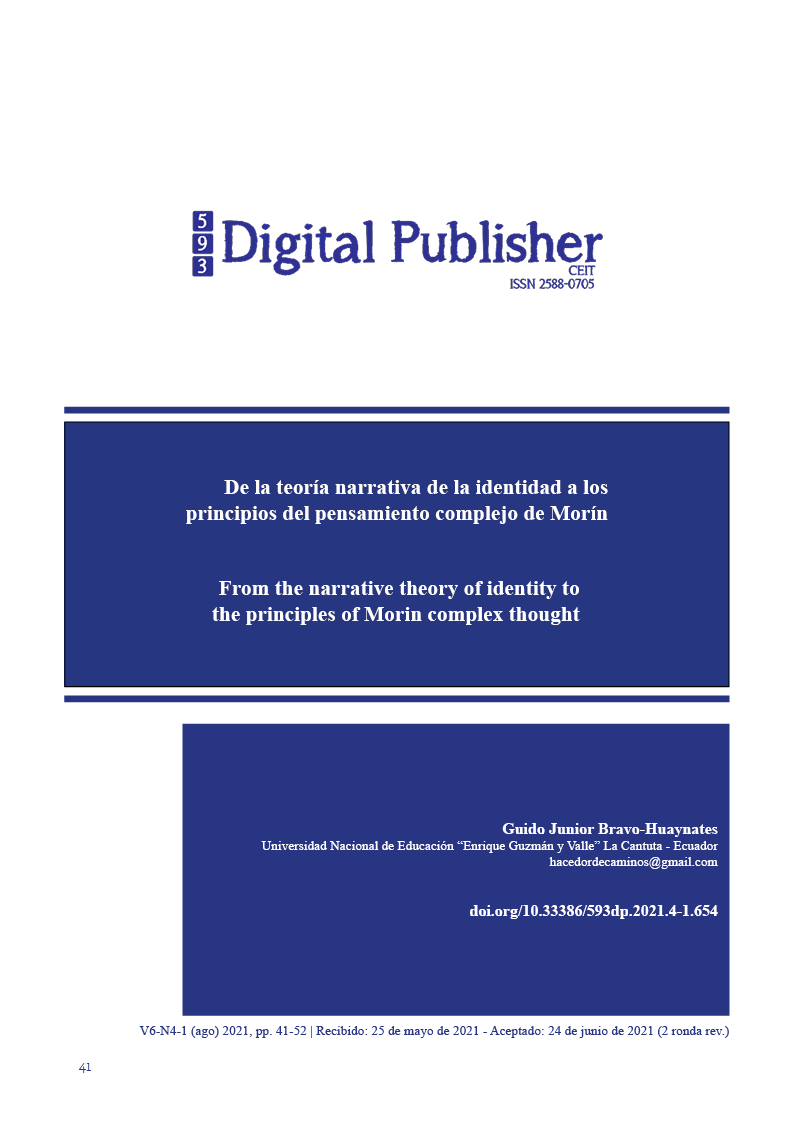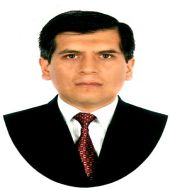From the narrative theory of identity to the principles of Morin complex thought
Main Article Content
Abstract
This article proposes a theoretical tour of the discussion on personal identity, which begins by considering the empiricist point of view, expressed in Locke s. XVII and Hume s. XVIII, in this line of argument, the three theses of Parfitt (1986) on personal identity are also collected, which attempt to reduce identity to the experience stored in a brain and, therefore, highlights the absolute predominance of the epistemological position of the identity. Then, this position is contrasted with the Narrative Theory of Ricoeur, (1996) who refutes Parfitt's thesis, pointing out aporias within the intellectual framework of the referred theses. Then, having neutralized Parfitt's project, Ricoeur raises the duality "character and promise" as opposite models of Identity. For this, the aforementioned author recovers the notions of "idem and ipse" as constituents of the first model of personal identity, the The same that he considers as a relational invariant, and opposes it to the "promise", these being two models, with which he proposes a Theory of Narrative Identity. The methodology used considers an inductive and chronological pattern. As the main source for data collection, the documentary analysis was taken into account, as well as the experience gathered throughout the doctorate in Complex Thinking of Multiversidad Mundo Real and the work and professional experience. It was found that Ricoeur manages to establish the reconciliation between the ontology and the epistemology of being in the discussion about personal identity, with which he places the discussion of identity in the field of complexity. It is concluded that, based on this reconciliation, contact points or bridges for approaching said theory can be considered from Morín's Principles of Complex Thought (1994).
Downloads
Article Details

This work is licensed under a Creative Commons Attribution-NonCommercial-ShareAlike 4.0 International License.
1. Derechos de autor
Las obras que se publican en 593 Digital Publisher CEIT están sujetas a los siguientes términos:
1.1. 593 Digital Publisher CEIT, conserva los derechos patrimoniales (copyright) de las obras publicadas, favorece y permite la reutilización de las mismas bajo la licencia Licencia Creative Commons 4.0 de Reconocimiento-NoComercial-CompartirIgual 4.0, por lo cual se pueden copiar, usar, difundir, transmitir y exponer públicamente, siempre que:
1.1.a. Se cite la autoría y fuente original de su publicación (revista, editorial, URL).
1.1.b. No se usen para fines comerciales u onerosos.
1.1.c. Se mencione la existencia y especificaciones de esta licencia de uso.
References
Adams, R. (2007). La red de la expansión humana. Universidad Iberoamericana AC. México.
Biblia de Jerusalén. (2014). Biblia de Jerusalen Latinoamericana. España. Desclée De Brouwer.
Cilliers, P. & Preiser, R. (2010). Complexity, difference and identity. Springer. Universidad de Stellenhouse. Sudáfrica.
Corona, N. (2003). El Psicoanálisis de Freud en la filosofía hermenéutica de Paul Ricoeur. Revista portuguesa de filosofía. 59(2), 513-547.
Herbert, A. (2016). Hermenéutica y Psicoanálisis: Paul Ricoeur y Alfred Lorenzer. Anuario de Investigaciones, (XXIII), 67-73.
Hume, D. (1963). ‘The Sceptic’, in Hume’s Essays. Oxford University Press.
Hume, D. (2008): Tratado de la Naturaleza Humana. Madrid: Editorial Tecnos.
Hume. D. (1975). An Enquiry Concerning the Principles of Morals. Oxford, Clarendon Press.
Iglesias, I. (2013). La noción de “texto” de Ricoeur y las funciones de la escritura en las psicosis según Lacan: aproximaciones metodológicas. Revistas Científicas Complutenses. Escritura e imagen. 9(2013), 293-320.
Locke, J., (1694). Essay Concerning Human Understanding. partly reprinted in Perry.
Morin, E. (1992). El Método IV: Las ideas. (Vol. 4), (Trad. del fr. por Ana Sánchez). Madrid: Cátedra.
Morin, E. (1993). El Método I: La naturaleza de la naturaleza. Madrid: Cátedra.
Morin, E. (1994). Introducción al pensamiento complejo. (Trad. del fr. por Marcelo Pakman). Barcelona: Gedisa.
Morin, E. (1999). 7 Saberes necesarios para la educación del futuro. UNESCO, Francia.
Morin, E. (2002a). La cabeza bien puesta. Repensar la reforma, reformar el pensamiento. Bases para una reforma educativa. Buenos Aires: Nueva Visión.
Morín, E. (2002b). Educar en la era planetaria. El pensamiento complejo como Método de aprendizaje en el error y la incertidumbre humana. UNESCO- Universidad de Valladolid. España.
Nietzsche, F., (2001). La Voluntad de Poder. Madrid: Edaf.
Parfit, D. (1987). Reasons and persons. USA. Oxford University Press.
Ricoeur, P. (1996). Sí mismo como otro. México. 3ra Ed. Siglo XXI Editores.
Tyrtania, L. (2008). La indeterminación entrópica. Notas sobre disipación de energía, evolución y complejidad. Desacatos, 28, pp. 41-68.


